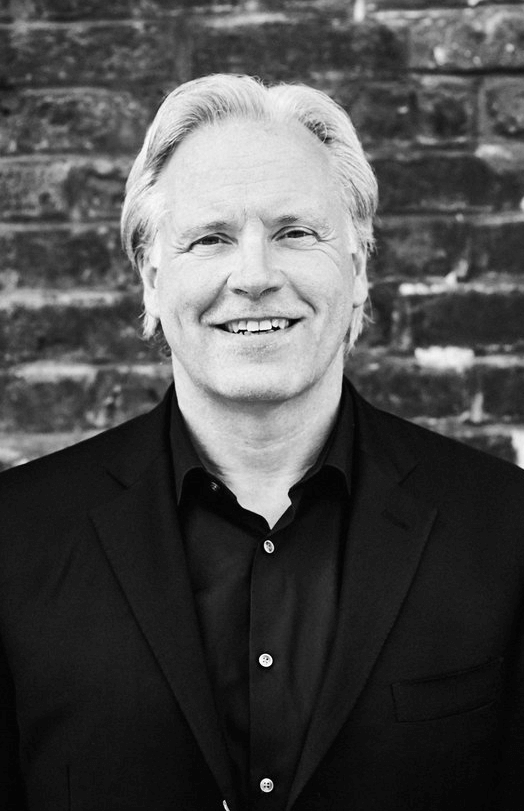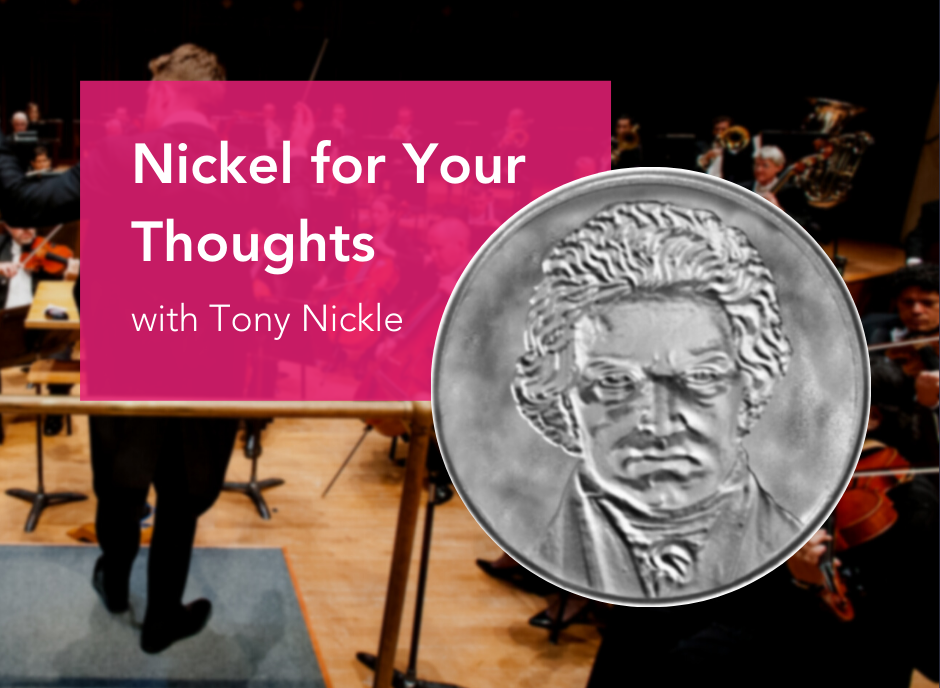In his own words, Vice President & Artistic Administrator Tony Nickle shares what he believes to be the high points of the program, “Beethoven to Brahms,” but with a little edge and humor for good measure.
Beethoven to Brahms
“Over the course of nine symphonies he fundamentally shaped the landscape of what would come after.“
I’m about to go down a delightful rabbit hole that doesn’t talk about our magnificent guest conductor this week, Markus Stenz, so let me begin by focusing on him for a moment: Maestro Stenz is an absolute powerhouse interpreter of 19th-century German repertoire, which is precisely where this weekend’s program lives. This is his debut in Jacksonville, and we are very, very lucky to have him leading the Symphony.

“…an absolute powerhouse interpreter of 19th-centry German repertoire…”
To read more about Markus Stenz, visit our featured artist profile for a full bio.
Now to follow the white rabbit…
Legends and Their Shadow
It’s interesting to think about the way that legends influence those that come after. I mean those that are larger than life in the way they impact their profession or specialty, usually one in a generation at most. Sports is one of the most universally identifiable and relatable field for most of us; we think of how Babe Ruth, Wilt Chamberlain, Dr. J, Tiger Woods and the Williams sisters so completely changed how subsequent athletes approached their respective sports (or in Wilt’s case, actually influenced rule changes because he was too dominant). The same would be said about actors like Marlon Brando, Robert DeNiro and Stella Adler.
Beethoven and Symphony ‘Legends’
This is what Beethoven was in the symphonic world, more than any one composer since. Over the course of nine symphonies, he fundamentally shaped the landscape of what would come after. Especially after his Ninth Symphony – which was on a scale completely unseen at the time – anyone who was anyone felt the shadow of his influence. I could spend a season’s worth of blogs talking about how he managed that monumental impact, but oversimplifying, it comes down to codifying new structural devices, expanded concept of scale (using said new structural devices), and achieved an unprecedented realization of drama in music without words. After his Ninth (and final) premiered in 1824 there was clearly a change in sentiment amongst composers who considered writing a symphony. Let’s think of some of the giants who would have been around at the time. Note, I’m including composers’ dates for chronological context to consider with that 1824 timestamp, not because I’m a history nerd (apologies to all nerds and history buffs):
Franz Shubert
ranz Schubert (1797 – 1828), who was 27 years Beethoven’s junior, really wrote only one more after 1824 before his very early death, but he spent three years on it (none of his previous eight took him more than one year), and its enormous size was undoubtedly influenced by Beethoven 9.
Robert Schumann
Robert Schumann (1810 – 1856), despite being a wildly confident youth, waited until 1841 to write his First Symphony.
Hector Berlioz
Hector Berlioz (1803 – 1869) took things in quite a different, programmatic direction with his 1830 Symphonie fantastique; probably partially because the French aesthetic was somewhat different than the German/Austrian at the time (it wouldn’t become worlds apart until the Impressionists) and partially because he likely didn’t feel he could say something meaningful in the style Beethoven had made conventional.
Brahms in Beethoven’s Shadow
But of all these great masters, none felt the suffocation of Beethoven’s shadow more than Johannes Brahms (1833 – 1897). At nearly 50 years old, he publicly declared, “I shall never write a symphony! You can’t have any idea what it’s like to hear such a giant [Beethoven] marching behind you.” That must have sounded even more menacing in German than this English translation. I wonder how much of this was purely this younger generations’ impressions of Beethoven’s music, and how much was just the psychology of aggrandizement, personal or public. It makes me think of this particular era of Tiger Woods at the top of his game: he was, without a doubt, one of the greatest golfers ever, if not the greatest. But there was a stretch in the early to mid 2000s where he was winning nearly 50% of the tournaments he entered. Looking at decades of stats this is surely more than objective dominance in a sport that is beyond unforgiving to the slightest dip in performance; there has to be some sort of psychological aspect that sapped the confidence of anyone else in that tournament. Everyone must have felt like they were playing for second, and that sounds very similar to the rhetoric we find in history books about the generation of composers after Beethoven.
The Symphonies of Brahms
But, Brahms did go on to write a First Symphony. He wrote four, in fact, and they deserve to be in that upper echelon of symphonies alongside the best of Haydn, Mozart, Beethoven, and Mahler. He directly, and I mean very directly, took the Beethovenian implements I described above and made them his own in his own voice and on an even grander scale. Despite decades of intimidation, his First Symphony likely achieved far greater heights because of his fear of Beethoven’s shadow. He spent 20+ years working on it, and along that path he crafted his own inheritance of the estate that Beethoven created. It isn’t Beethoven-light, Beethoven-derivative, or lipstick on a Beethoven pig; it’s a masterpiece that made a definitive statement to the late 19th-century: Beethoven’s legacy has many generations of life left in it, and I am the torch bearer that will continue it. This is the moment Of course Richard Wagner had very different ideas, but that’s something we can explore in another program in another season. For now, get yourself to Jacoby Symphony Hall this Friday or Saturday evening to hear this thread in gorgeous, moving music. You’ll pick up on this heritage while listening live in ways you never will listening to Spotify or a CD.
Learn More & Watch Live
To learn more about this program, “Beethoven to Brahms,” featuring Brahms triumphant Symphony No. 1, be sure to read the full program notes as well as Markus Stenz’s full bio. Interested in watching live? Tickets are still available to purchase on the Beethoven to Brahms event page for Friday, February 18, and Saturday, February 19, at 7:30 PM.


